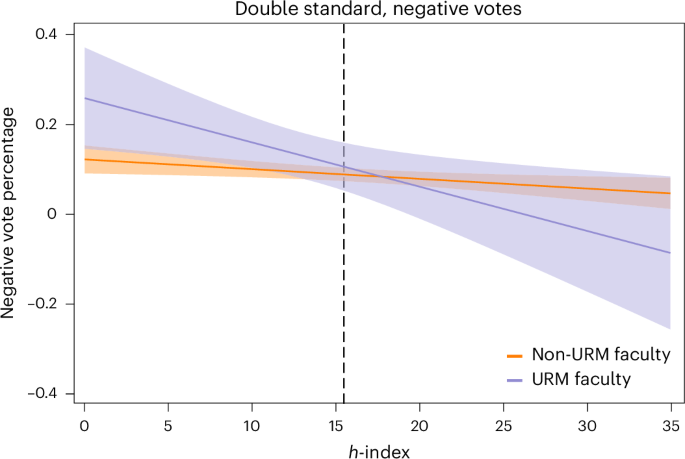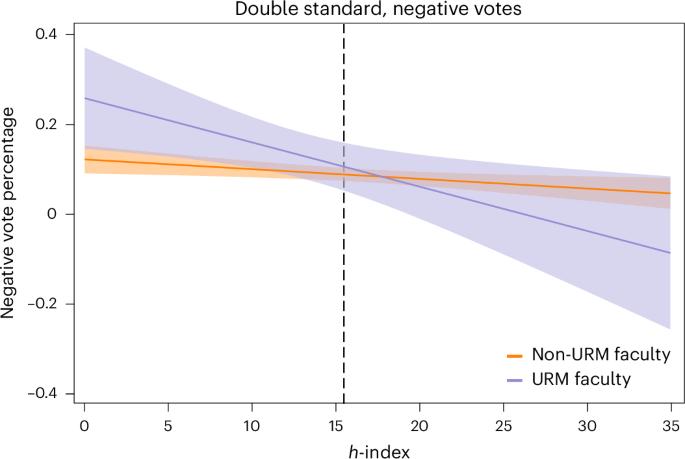Underrepresented minority faculty in the USA face a double standard in promotion and tenure decisions
IF 21.4
1区 心理学
Q1 MULTIDISCIPLINARY SCIENCES
引用次数: 0
Abstract
Underrepresented minority (URM) faculty face challenges in many domains of academia, from university admissions to grant applications. We examine whether this translates to promotion and tenure (P&T) decisions. Data from five US universities on 1,571 faculty members’ P&T decisions show that URM faculty received 7% more negative votes and were 44% less likely to receive unanimous votes from P&T committees. A double standard in how scholarly productivity is rewarded is also observed, with below-average h-indexes being judged more harshly for URM faculty than for non-URM faculty. This relationship is amplified for faculty with intersectional backgrounds, especially URM women. The differential treatment of URM women was mitigated when external reviewers highlighted candidates’ scholarship more in their review letters. In sum, the results support the double standard hypothesis and provide evidence that different outcomes in P&T decision-making processes contribute to the sustained underrepresentation of URM faculty in tenured faculty positions. Masters-Waage et al. report that underrepresented minority (URM) faculty in the USA face barriers in the promotion and tenure process, receiving more negative votes and fewer unanimous positive decisions at the college level. This is partly due to a double standard: URM faculty are held to a higher standard than non-URM faculty in terms of scholarly productivity.


美国少数族裔教师在晋升和终身教职决定中面临双重标准
从大学录取到基金申请,代表人数不足的少数民族(URM)教师在学术界的许多领域都面临着挑战。我们研究了这种情况是否会转化为晋升和终身教职(P&T)的决定。来自美国五所大学的 1,571 名教职员工的晋升和终身教职决定数据显示,少数民族教职员工获得的反对票比其他教职员工多 7%,获得晋升和终身教职委员会全票通过的可能性比其他教职员工低 44%。在如何奖励学术生产力方面也出现了双重标准,对低于平均水平的 h 指数的评判,统招研究生教职员工比非统招研究生教职员工更为苛刻。这种关系对于具有交叉背景的教职员工,尤其是统招女性教职员工更为明显。当外聘评审人在评审信中更多地强调候选人的学术成就时,统招女性受到的差别待遇就会得到缓解。总之,研究结果支持双重标准假说,并提供证据表明,P&T 决策过程中的不同结果导致了终身教职中 URM 教师人数的持续不足。
本文章由计算机程序翻译,如有差异,请以英文原文为准。
求助全文
约1分钟内获得全文
求助全文
来源期刊

Nature Human Behaviour
Psychology-Social Psychology
CiteScore
36.80
自引率
1.00%
发文量
227
期刊介绍:
Nature Human Behaviour is a journal that focuses on publishing research of outstanding significance into any aspect of human behavior.The research can cover various areas such as psychological, biological, and social bases of human behavior.It also includes the study of origins, development, and disorders related to human behavior.The primary aim of the journal is to increase the visibility of research in the field and enhance its societal reach and impact.
 求助内容:
求助内容: 应助结果提醒方式:
应助结果提醒方式:


